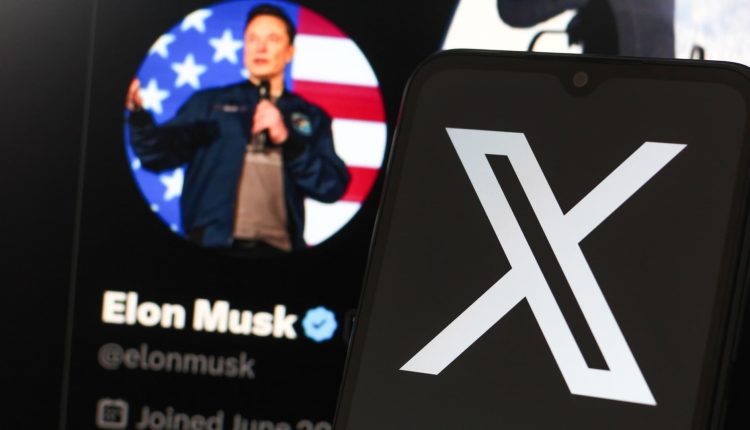Thomas Fuller | SOPA images | Light rocket | Getty Images
A judge ordered X and xAI to file the lawsuit Apple and OpenAI for attempting to maintain monopolies in artificial intelligence markets must remain in federal court in Fort Worth, Texas, despite all companies having “at best minimal ties” to that geographic area.
Judge Mark Pittman, in a sharply tongue-in-cheek four-page order on Thursday, encouraged the companies to move their headquarters to Fort Worth because they preferred that the antitrust lawsuit be heard there.
In a footnote, he even pointed out that the companies were on the City of Fort Worth’s Business Services Department website “to begin the process of relocating there.”
Pittman’s order implicitly targets the tendency of some conservative plaintiffs to file lawsuits in the Fort Worth division of the U.S. Northern District Court of Texas to increase their chances of receiving favorable rulings from the two judges there, both appointed by Republicans.
These plaintiffs included X and TeslaBoth are controlled by mega-billionaire Elon Musk, who was a top adviser to President Donald Trump until earlier this year.
Pittman was appointed by Trump but criticized the practice of targeting lawsuits to specific jurisdictions, known as forum shopping.
In his order Thursday, Pittman said the Fort Worth Division docket is two to three times busier than the Dallas Division docket, which has more judges.
Pittman’s order noted that, other than several Apple Stores, neither Apple nor OpenAI has a strong connection to Fort Worth.
“And of course, by that logic, there is no district or division in the entire United States that would not be an appropriate venue for this lawsuit,” Pittman wrote.
X Corp. is headquartered in Bastrop, Texas – about 200 miles south of Fort Worth – while both Apple and OpenAI are headquartered in California. Musk’s xAI acquired his social media company X in an all-stock transaction in March.
“Given the current desire to have venue in Fort Worth, the numerous high-risk lawsuits previously decided in the Fort Worth Division, and the vitality of Fort Worth, the Court strongly encourages the parties to consider relocating their headquarters to Fort Worth,” the judge wrote.
“Fort Worth has much more to offer than just the unique artwork on the fourth floor of its historic federal courthouse,” Pittman said.
The judge had asked the three companies to explain why the case was in Fort Worth court.
But neither Apple nor OpenAI asked to move the case before the judge’s Oct. 9 deadline, Pittman noted in the order.
Read more about CNBC’s politics coverage
Still, Pittman decided to keep the case in the Fort Worth division.
“The fact that neither defendant has filed a motion to change venue serves as a quid pro quo to the court,” the judge wrote. “And respect for the court.”[s]“Choice of place of jurisdiction by the plaintiffs.”
“But the Court does not make its decision lightly or without reservation. This case has, at best, minimal ties to the Fort Worth Division of the Northern District of Texas,” Pittman wrote. “Perhaps one of the plaintiffs’ strongest arguments is the mere fact that ‘Apple is selling'[s] iPhones [in this Division] (and many other products) and OpenAI offering[s] ChatGPT nationwide.”
“After more than a decade of service, presiding over thousands of cases in three different courts, the undersigned continues to firmly believe that ‘[v]Enue is not a continental breakfast; “You cannot choose where and how a lawsuit is filed at the whim of a plaintiff,” the judge complained.
But Pittman found he had little to no choice in deciding to keep the lawsuit in his courthouse.
The U.S. Court of Appeals for the 5th Circuit, whose jurisdiction includes federal courts in Texas, has “raised the standard for change of venue to a new level,” Pittman wrote.
Last year, the 5th Circuit twice struck down Pittman’s order to move to Washington, D.C., a lawsuit brought by trade groups representing major banks challenging a rule issued by the Consumer Financial Protection Bureau that capped credit card late fees at $8 per month.
The 5th Circuit said Pittman’s court “clearly abused its discretion” in trying to delay the case.
OpenAI declined to comment to CNBC, referring a reporter to its public filings in the lawsuit. X and Apple did not immediately respond to a request for comment.
Musk’s X and xAI sued Apple and OpenAI in August, accusing the companies of an “anti-competitive scheme” to maintain monopolies in artificial intelligence markets.
The lawsuit accused Apple of favoring OpenAI’s ChatGPT in its app store rankings and disadvantaging other competitors such as xAI’s Grok.
Earlier this month, a judge in Washington, DC, blocked Musk’s request to move the Securities and Exchange Commission’s lawsuit over his alleged improper disclosure of his stake in Twitter to Texas. After purchasing the company, Musk renamed Twitter X.


Comments are closed, but trackbacks and pingbacks are open.